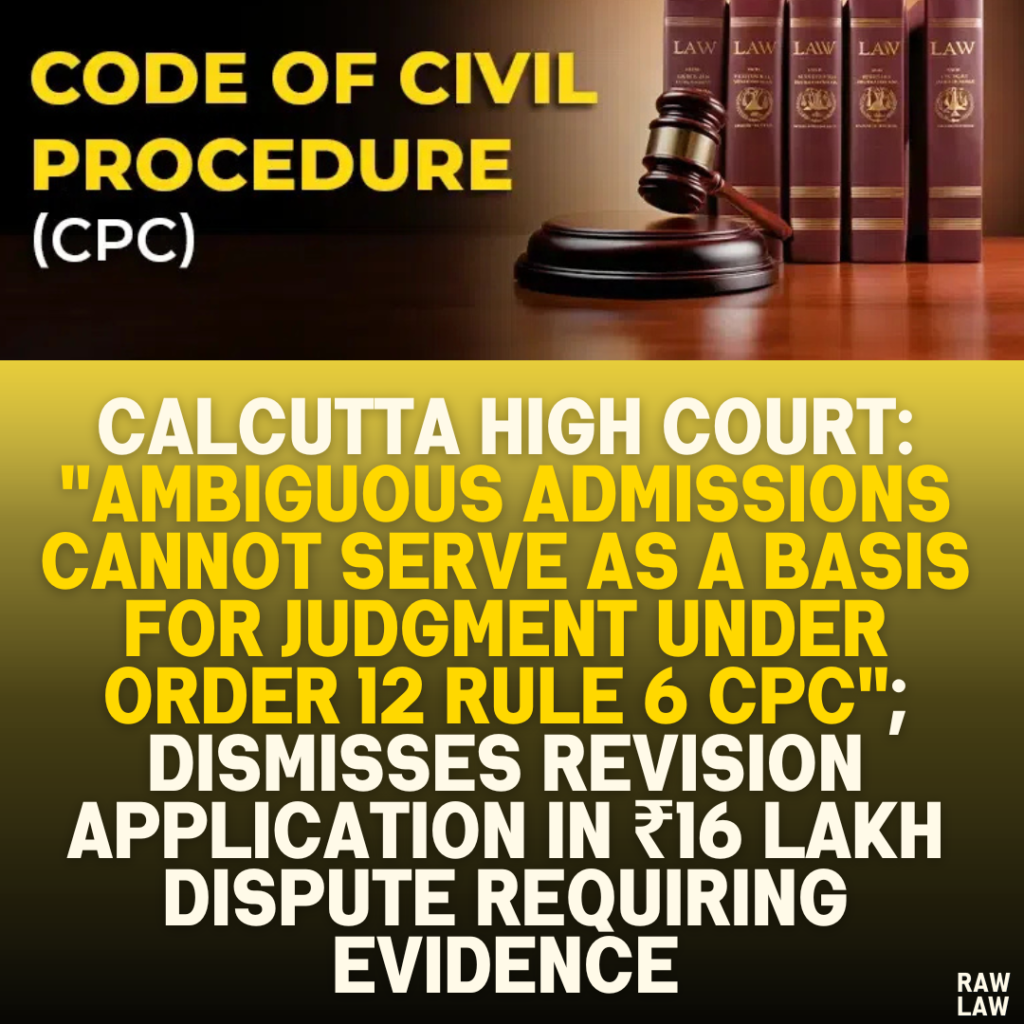Court’s Decision
The Calcutta High Court dismissed the civil revision application (C.O. 504 of 2022) challenging the trial court’s order, which rejected the plaintiff’s request for a judgment on admission under Order 12 Rule 6 of the Code of Civil Procedure (CPC). The court held that the defendants’ admissions were not clear, unambiguous, or unconditional, as required under the said provision. The trial court’s observation that the issue required evidence was upheld.
Facts
- The plaintiffs filed a suit seeking accounts and an injunction, claiming the defendants owed them approximately ₹16 lakhs.
- The defendants, in their written statement, acknowledged receipt of ₹16 lakhs but claimed ₹7.47 lakhs had been adjusted against brick supplies, leaving a disputed balance.
- Plaintiffs filed an application under Order 12 Rule 6 CPC for a judgment on admission based on this acknowledgment, but the trial court rejected the application, citing the lack of unequivocal admission.
Issues
- Whether the statements made by the defendants in their written statement constituted an unequivocal and unambiguous admission of the plaintiff’s claim.
- Whether the plaintiffs’ application for judgment on admission under Order 12 Rule 6 CPC was maintainable given the circumstances.
Petitioner’s Arguments
- The petitioners argued that the defendants had admitted liability for the amount claimed in the suit in paragraphs 12 and 13 of their written statement.
- They emphasized that their earlier application was not decided on merits, making the current revision application maintainable.
- Reliance was placed on precedents emphasizing the discretionary power of courts under Order 12 Rule 6 CPC to pass judgments based on admissions.
Respondent’s Arguments
- The respondents contended that the application under Order 12 Rule 6 CPC was not maintainable due to the lack of clear and unequivocal admission.
- They argued that the earlier revision application (C.O. 226 of 2006) against the same order was withdrawn without liberty to refile, rendering the present application barred under Order 23 Rule 3 CPC.
- The respondents cited several precedents supporting their arguments on maintainability and clarity of admissions.
Analysis of the Law
- Order 12 Rule 6 CPC: The court reiterated that judgments under this provision are discretionary and require clear, unconditional, and unequivocal admissions from the opposing party.
- The court underscored that the provision aims to expedite proceedings but cannot be used in cases involving disputed claims or ambiguous admissions.
- The court distinguished between procedural discretion and substantive rights, emphasizing that judgments on admission cannot be claimed as a matter of right.
Precedent Analysis
- Uttam Singh Duggal & Co. Ltd. v. United Bank of India (2007): Admission-based judgments aim to avoid unnecessary trials but must meet the threshold of clarity.
- Sudipta Banerjee v. Ashis Kumar Sen: Highlighted the discretionary nature of judgments under Order 12 Rule 6 CPC.
- Sarguja Transport Service v. State Transport Appellate Tribunal: Withdrawal of cases without liberty affects subsequent legal actions.
- Other cases reiterated the principle that ambiguous admissions cannot serve as a basis for judgment under Order 12 Rule 6 CPC.
Court’s Reasoning
- The court agreed with the trial court’s findings that the statements in paragraphs 12 and 13 of the defendants’ written statement did not constitute unequivocal admissions.
- It held that the defendants’ acknowledgment of receipt of ₹16 lakhs, coupled with their claim of adjustments and offers to supply bricks against the remaining amount, required evidence for resolution.
- The court dismissed arguments on maintainability raised by the respondents, noting that the earlier revision application had been withdrawn due to the dismissal of the suit, which was later restored.
Conclusion
The revision application was dismissed for lack of merits. The court directed the trial court to expedite the suit’s disposal due to its prolonged pendency. All connected applications and interim orders were disposed of accordingly.
Implications
- The judgment reinforces the principle that admissions under Order 12 Rule 6 CPC must be unequivocal and unconditional.
- It highlights the discretionary nature of courts in granting judgments on admissions, emphasizing the importance of procedural clarity.
- The case also serves as a reminder of the procedural requirements for withdrawing and refiling applications in civil suits.




Pingback: Supreme Court Upholds Land Acquisition for Yamuna Expressway Integrated Development, Validates Urgency Provisions Under the Land Acquisition Act - Raw Law
Pingback: Gauhati High Court Upholds Zone-Based Allocation and Promotions for Post of Inspector of Central Excise: "Claims Must Be Filed Within One Year; Respondent’s Decade-Long Delay Renders Grievance Time-Barred" - Raw Law
Pingback: Delhi High Court Dismisses Petition Alleging Corruption in Pragati Maidan Redevelopment Project: "Involvement of Government Entities in the Redevelopment Project Did Not Automatically Make the Case a Matter of Public Interest"; Highlights Altern